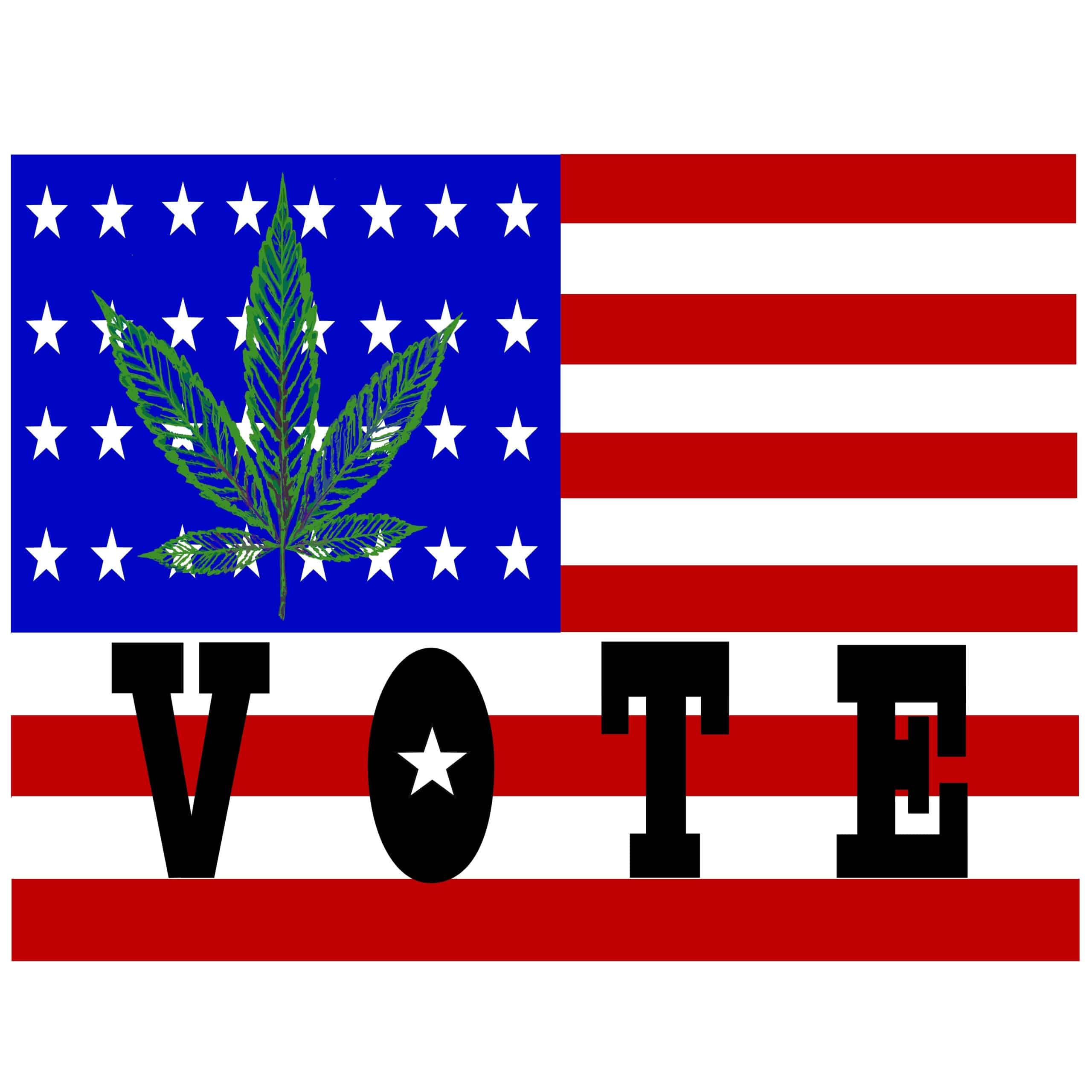
The battle is on in South Dakota; where no less than four possible ballot measures related to cannabis, are now under consideration.
Two voter ballot measures in South Dakota for legalization
In a minute I’ll get to why its weird that South Dakota has any voter ballot measures to legalize recreational cannabis at all. But, first, lets look at two of the ballot measures which might get put in front of the voting public, in the next election season. The biggest difference between the two measures, is in whether there would be a sales market, or not.
One ballot was filed earlier in the year by the activist group South Dakotans for Better Marijuana Laws (SDBML). This is the non-sales measure; although its not so much that it rules out sales, so much as it just doesn’t involve language or regulation for sales. What it would do, is legalize possession, use, and cultivation, for those 21 and above.
It would allow for distribution: but says nothing of licensing, taxation, or anything else sales related. This is similar to what is popping up in Europe, to get around EU laws against sales markets. It also means legalizing without worrying about a competitive sales markets, and it automatically excludes the idea of charging unnecessary sin taxes.
One of the issues with the measure, is that its written very broadly. As per the attorney general, “Judicial or legislative clarification of this measure may be necessary.” I expect this is a strategy to get the bill through, since there are so many issues in the state with the governor; and an earlier legalization measure was repealed. This does leave black holes in some places.
The second legalization ballot
The second of the ballot measures for legalization in South Dakota was introduced recently by state resident Emmett Reistroffe; the director of operations at Genesis Farms, a medical cannabis enterprise. This bill “allows individuals 21 of age or older to possess, grow, ingest, and distribute marijuana or marijuana paraphernalia.” It also would allow adults to have three ounces of cannabis flower; and up to 24 grams of concentrate. Each individual could cultivate six plants, or 12 plants for a house.
Unlike the competing measure, it would also open the door to a sales market; which we see in all other legal locations thus far, in the US. According to this measure, the state’s Department of Health would have to issue dual licenses to medical dispensaries for recreational sales, and there would be no ability for local governments to stop this in their jurisdictions, though they would have the right to limit the number in their specific locations. There was nothing said about the particulars of taxation.
Additionally, this measure would allow gifting weed, under the language that the plant can be transferred between people, ‘without consideration.’ Beyond gifting, however, the bill does focus more on legal sales. In fact, it seems the bill author is focused on the idea that sales actually must be a part of a legalization.
According to Reistroffer, “If South Dakotans want to make cannabis legal for adult use, there needs to be regulations and licensing in place. I’m optimistic that a majority of South Dakotans support legalization, and it makes sense for adult use to build off the current regulatory program in place for medical cannabis.”
Ballot measures to prohibit
The SDBML measure was given a final summary by the Attorney General’s office in August of this year. A summary for Reistroffer’s measure was released by the Attorney General’s office on Friday, the 17th of November. The public has until the 27th of November to comment, and a final summary must be given to the Secretary of State on December 7th.

Assuming it moves forward from this point, Reistroffer then must collect valid signatures. In order to get on the ballot, the initiative needs 17,509 signatures. This is true for any of the ballots. If a measure cannot get the signatures on time, it cannot be certified for the election. Right now, Reistroffer gained the ability to move to the next level only.
These two legalization measures are up against two other possible ballot measures in South Dakota, which would restrict weed use in the state. One is designed around repealing the medical ballot (which passed with 70% of the vote, to give an indication how much the public wants this). This initiative is spearheaded by fringe extremist activist Travis Ismay. Ismay filed a petition in the spring to get the current medical legalization repealed; and seems genuine unconcerned about how this affects patients
The second limiting ballot measure is also spearheaded by Ismay, and this one would be to inhibit future ballot measures for drug reform measures related to federally illegal compounds. So not only is Ismay trying to get rid of what was already voted in by wide margins; but he wants to make it so that so long as weed is not legal federally, that it can’t be voted on in a comparable way in the future. This is a guy who blatantly said he didn’t care about patients, and who has openly made – and supported – racist remarks.
As of yet, none of these ballots are officially certified. That probably won’t happen until much closer to the 2024 elections. But it is an interesting range, especially if all four make it on. Two will be gunning for a recreational legalization (one with sales market, one without), and two attempting to prohibit cannabis use (one a retraction of a law, the other a ban on legalization ballots). No matter which side you lean toward, South Dakota just became the most interesting state to watch when it comes to weed.
South Dakota and recreational cannabis
During 2020 elections, South Dakota voted in both recreational and medical cannabis, via Amendment A and Measure 26, respectively. Though this should mean that South Dakota is among the legal states, it is not involved in this count. The reason is because the state’s own governor, Kristi Noem, conspired with law enforcement and (possibly) the judicial system as well, to take the voter-won measure away.
To be clear, legislatures can reverse voter ballots, but this move is generally not seen. These measures are voted-in directly by the population, and so are members of the legislature. It’s a PR nightmare to openly deny the people what they voted for; and could cost any elected official, their seat in the next election. Which explains Noem’s backhanded moves to take the legalization away; rather than to openly repeal it, and face direct backlash.

The story gets even more sketchy when we get to the 2022 midterm elections. South Dakota voters once again had a voter ballot measure put in front of them to legalize recreational cannabis, in place of the measure taken away by the governor. Amendment A passed with 54% of the vote; which isn’t a landslide victory, but enough to show the population as onboard with legal weed. Now consider that weed acceptance goes on a pretty specific trajectory up, and its doing so quickly, especially in America. The trend is not going in the other direction.
I point this out because in the 2022 elections, Measure 27 to legalize recreational cannabis, failed with only 47.08% voting yes. This indicates that 7% of the voting public changed their minds negatively about cannabis in the same two-year period that we see increases in acceptance in every other part of the country. And this didn’t happen just anywhere, but in a state where the governor is so against legalization, and so uncaring of the will of her own people; that she went behind the backs of the public, to reverse what the public voted-in. Anyone else see a problem here?
What about medical?
In fact, Noem also put quite a bit of effort into delaying the medical cannabis legalization as well, including an attempt at a bill to formally delay it. She was not successful in hurting this program yet, but now there’s Ismay’s ballot measures for the repeal of the law, and to prevent new legalization ballot measures in the future. These came about right as Noem found herself unable to prevent the industry in an above board way.
Whether Noem is directly behind these or not, is hard to say; but given her history, it doesn’t seem out of the question. In fact, it seems pretty likely. Ismay makes for a good front, which takes attention off of her. As Noem is still the governor, despite repeatedly performing moves against the interests of her own people; it stands to reason that her backhanded methods have allowed her to stay in office. Its incredibly hard for me to believe that Noem isn’t behind both of these ballots. I mean, even as an extremist activist, why would Ismay work that hard to prevent future ballots?
Currently in South Dakota, since the voted-in legalization was not taken seriously by the government, the laws remain the same. Possessing up to two ounces is a misdemeanor which incurs a year in prison, and up to $2,000 in fines. Two ounces – 1/2lb is a felony with two years in prison, and up to $4,000 in fines. ½lb – one pound comes with five years in prison and $10,000 in fines, and from 1-10lbs incurs 10 years prison time and $20,000 in fines. Possessing more than 10lbs will get a person 15 years in jail, and $30,000 in fines.
Conclusion
2023 elections brought us one recreational ballot measure, Ohio. That state is now the 24th legal state for recreational use. 2024 elections are already gearing up to be way more interesting, with multiple states, like South Dakota, Florida, and California looking to put ballot measures in front of voters, concerning different cannabis matters. It might even be better than going to the movies.
Welcome weed aficionados, thanks for being here. You made it to Cannadelics.com; where we report on the most interesting stories in the drugs world at large. Stop by frequently to stay current on what’s going on; and subscribe to the Cannadelics Weekly Newsletter, for direct updates and promos, straight to your email.






